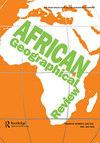How COVID-19 has affected research productivity in Africa: lessons for the future
IF 0.9
Q3 GEOGRAPHY
引用次数: 1
Abstract
ABSTRACT The purpose of this paper is to investigate how the COVID-19 pandemic has differentially affected the productivity of researchers from different backgrounds and showcase the factors that are responsible for these inequalities. Data for this study were collected using an electronic questionnaire via Qualtrics, distributed to researchers across Africa. Three hundred and eleven Participants completed the questionnaire in August/September 2020. Our results show that although overall time spent working during COVID-19 has increased, this has not translated into enhanced levels of productivity. Researchers are spending about 22 hours per week extra working than before the COVID-19 pandemic hit. Male researchers were able to spend more time on publications, patents, and consulting activities than their female counterparts. .COVID-19如何影响非洲的研究生产力:对未来的教训
摘要本文的目的是研究新冠肺炎大流行如何对来自不同背景的研究人员的生产力产生不同的影响,并展示造成这些不平等的因素。这项研究的数据是通过Qualtrics使用电子问卷收集的,并分发给非洲各地的研究人员。311名参与者于2020年8月/9月完成了问卷调查。我们的研究结果表明,尽管新冠肺炎期间的总体工作时间有所增加,但这并没有转化为生产力水平的提高。与新冠肺炎大流行之前相比,研究人员每周额外工作约22小时。男性研究人员能够比女性研究人员花更多的时间在出版物、专利和咨询活动上。
本文章由计算机程序翻译,如有差异,请以英文原文为准。
求助全文
约1分钟内获得全文
求助全文

 求助内容:
求助内容: 应助结果提醒方式:
应助结果提醒方式:


